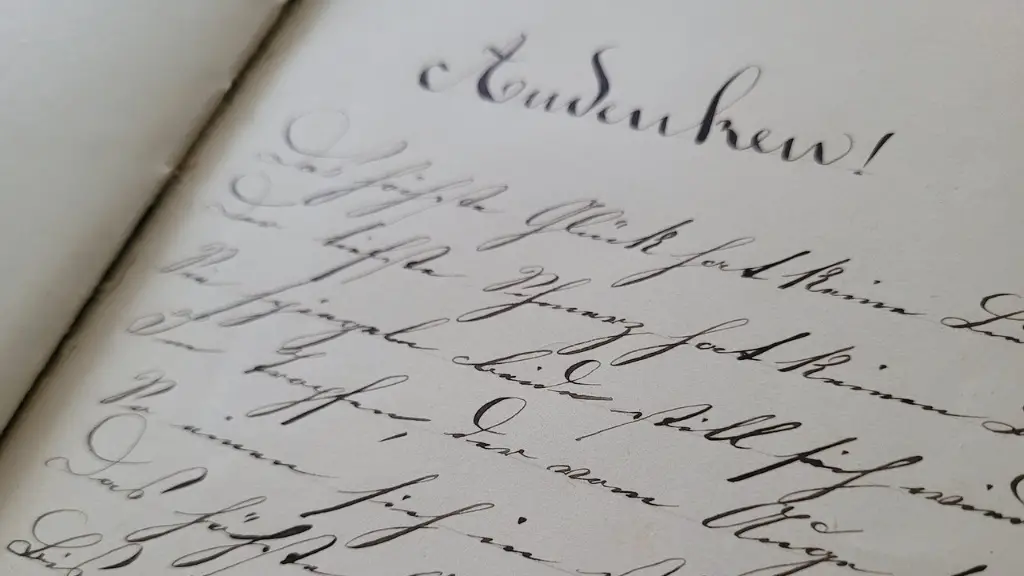Have you ever heard of spoken poetry? If not, we have all the information you need to know about this exciting new way of expressing thoughts, ideas, and emotions! Spoken poetry is an art form where the poet expresses their poem through reciting it out loud, often with a beat or music behind them. Spoken poetry may also be accompanied with props, intonations, and other visual elements to bring a more complete and engaging experience to the audience. This form of poetry has become increasingly popular in recent years, as it allows poets to bring their work to life and connect with their audience in a powerful and meaningful way.
In spoken poetry, there are no rules or limits to what can be included. Even works that are traditionally known in other forms of poetry, such as haikus, sonnets, and free verse can be altered to fit the spoken poetry style. This kind of creative freedom can result in highly progressive and inspirational works that stand out from the crowd. Not only that, but spoken poetry tends to have more of an emotional impact than written poetry. This can be attributed to the poet’s ability to employ vocal inflections and body language to emphasise certain words or points, making the poem even more engaging for the audience.
The content of spoken poetry can vary greatly. Poets can write about anything, ranging from deeply personal experiences to more abstract concepts. Spoken poetry is also often used as a form of activism, as it gives poets a platform to voice their opinions on current issues or important topics. No matter the theme or purpose of the poem, the artist has complete freedom to express it in the style they see fit.
So how do we get started? Well it all begins with the poem. Take some time to think about what topics you want to explore, and start writing. It’s also important to remember that spoken poetry should be a performance, so try to incorporate elements that will make the poem engaging for the audience. Think about intonations, gestures, props, and other ways to make your work stand out, while keeping the poem’s main message intact.
When the poem is ready, it’s time to rehearse and practice. Rehearsing can help you become more comfortable with the poem, as well as helping you to incorporate the elements mentioned earlier. This can also be a great time to use a beat or music, as it can really bring the poem to life for the audience.
Finally, it’s time to present. This can be done anywhere, so don’t be afraid to experiment with different settings. Spoken poetry can be performed in a variety of places, from concerts to open mic nights, so it’s important to find the best venue for your poem. You may also want to consider recording your performance, as this can help you look back and evaluate how you could improve or change elements of your poem.
Improving Your Skill
Once you have started writing and performing spoken poetry, it’s important to focus on improving your skill. A great way to do this is to watch and listen to other spoken poetry artists. This is an excellent way to gain insight into different styles, as well as discovering approaches you may not have thought of before. It’s also important to keep a journal and document your progress, as this allows you to look back and reflect on how far you have come.
In addition to your own practice, it can be helpful to take some time to read other written poems. Whilst this may sound counterintuitive, it can be a great way to hone your understanding of different poetic techniques and to help you gain the confidence to express yourself through spoken poetry.
Finally, don’t be afraid to experiment. Spoken poetry is a very forgiving art form, and mistakes are expected. Keep challenging yourself and pushing the boundaries of what you can create. This is an excellent way to stay inspired and to keep your work interesting and engaging.
Benefits of Spoken Poetry
Spoken poetry can help you to express yourself in a powerful and meaningful way. Not only can it be a great tool for social justice and activism, it can also be a great way to inspire and engage audiences. Being able to bring your poem to life through your words and actions can help you to make a lasting impression, and can provide a great platform to get your ideas across.
Spoken poetry can also be hugely beneficial for the performer. It gives you complete creative freedom to explore any topic or issue, and to do so in the way that feels comfortable to you. It can also help to develop important communication and performance skills, as well as aiding in the development of confidence and self-esteem.
A Form of Self Expression
At its core, spoken poetry is a form of self-expression. It gives you the opportunity to explore any topic and to deliver your work in whichever style you feel best. It’s a great way to make a lasting impression, and to create work that is both emotive and engaging for the audience. There’s no one way to write or perform spoken poetry. It can be whatever you want it to be, so don’t be afraid to experiment and explore your ideas.
Spoken Poetry in the Online Space
In recent years, we have seen the emergence of spoken poetry in the online space. With the help of social media platforms such as YouTube and Instagram, poets from around the world have been given the opportunity to share their work with a wider audience. This has been beneficial not only to the poets, but also to the audience. It allows spoken poetry to reach people all over the world, and to inspire and engage them with powerful performances and thought-provoking ideas.
An Unparalleled Experience
There’s something special about spoken poetry that makes it stand out. It allows the poet to combine all their creative skills and to truly express their ideas. No matter the purpose of the poem, spoken poetry can provide an unparalleled experience that allows artists to reach and engage with an audience in a meaningful and emotive way.



